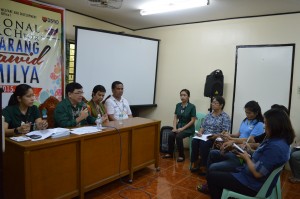
La Union partner media once again pledged their support to increase the public’s awareness on DSWD’s Pantawid Pamilyang Pilipino Program (Pantawid Pamilya) and Listahanan in a Press Conference held recently.
The education, health, nutrition, and values-formation through the Family Development Sessions (FDS) are the focus of the Pantawid Pamilya. To ensure the beneficiaries’ capacity to improve their well-being, other programs and services of the Department such as the Sustainable Livelihood Program and Kalahi-CIDSS are converged with Panatwid Pamilya. Thus was explained by Director Marcelo Nicomedes J. Castillo.
“The selection of beneficiaries in 2008 was based on their condition at that time which may have improved through the years, but delisting them because of the perceived improvement in their lives would still entail a rigorous process of assessing the capability of families,” Director Castillo continued.
On cases observed in the communities, proper reporting to the concerned staff was encouraged for appropriate action through Pantawid Pamilya’s grievance system.
“On erring Pantawid Pamilya beneficiaries, strict implementation of policies is done for the program not to be taken for granted,” said supportive Paoay, Ilocos Norte Mayor Dolores Clemente.
Monitoring FDS and motivating more families to become model or ‘huwarang pamilya’ are among the activities of barangay officials in support to the Pantawid Pamilya as shared by Lucao, Dagupan City Kagawad Roger Paragas.
Director Castillo emphasized the strong support of Local Government Units, barangay officials, and civil society organizations in improving the socio-economic conditions of the poor families.
On the other hand, Listahanan or National Household Targeting System for Poverty Reduction (NHTS-PR)’s validation on the soon to be released ‘list of poor families’ was mentioned as a crucial process for a complete, clean list and correct data. During this phase, the initial list of poor will be displayed at conspicuous public places.
With these, the media were encouraged to increase dissemination on the participation of community local residents to report any discrepancy in the list or even the exclusion of ‘deemed poor’.
These observations will be elevated to the Local Verification Committee for action, correction, or re-assessment .
Currently, the Listahanan assessed 864,173 families in Region 1 as reported by Regional Field Coordinator Joan Nuesca. (by: Iryn D. Cubangbang, Information Officer II)

